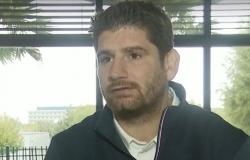Unveiled in official competition in Cannes, Bird is, without bad puns, a rare bird. Part of both the continuity of Andrea Arnold’s work while marking a turning point, this fragile cinematographic object will undoubtedly appeal more to film buffs already attached to the filmmaker. Once again, it is a delicate portrait of a young girl on the eve of becoming a young woman. Between an irresponsible father and a strange new friend, 12-year-old Bailey will experience a summer that will forever transform the course of his life — literally.
True to form, Andrea Arnold sets her story in a difficult social context, here dilapidated social housing towers. We meet Bailey (Nykiya Adams, a real revelation) as she films a bird with her phone. This is common among teenagers, who then like to project these images onto the walls of her “bedroom”, that is to say the bare room that she shares with her older brother, Hunter (Jason Buda, erased, but fair).
Both live with their father, Bug (Barry Keoghan, star of Saltburnexalted as desired). Enter the scene of another recurring figure in Andrea Arnold’s cinema: that of the neglectful parent. Since his debut, in fact, his Oscar-winning short film Waspin which a woman makes a suitor believe that she is only the guardian of her four children, Arnold explores the theme of defective parenting from various angles, but most often from the point of view of the offspring left behind. to herself.
In BirdBug is actually a child himself: a drug addict and narcissist, he is about to remarry, and the (illegal) financing of the event is the only thing that concerns him. While brother plays it Clockwork Orange (A Clockwork Orange) with her band of pseudo-vigilantes, Bailey is alone most of the time. And that suits him.
Because Bailey clearly appreciates the calm that solitude provides, especially after his father’s occasional outbursts. And there’s his mother, who lives with a bully on the other side of town… When Bailey ventures there, it’s first to make sure that his young half-sisters are okay GOOD.
Of infinite empathy
All this could have given rise to a felt, but banal, social drama… had it not been for this curious young man whom Bailey sees one day in a field.
His name is Bird (Franz Rogowski, seen in Passagesfascinating), and he seeks to find traces of his father, who once abandoned him. Through this singular character, Andrea Arnold brings back another key motif of her cinema: the attractive, dangerous or mysterious male figure, who fascinates the young protagonist, and of which we have come across variations in Fish Tank, American Honey, Wuthering Heights…
In this case, the independent Bailey befriends Bird, and after she helps him, he helps her. And it is through Bird, the character, that Bird, the film, distinguishes itself from previous works by Andrea Arnold.
In fact, if we find this known and loved mixture of social realism (in the infrastructures) and poetic realism (during the asides in nature) dear to the filmmaker, Arnold this time adds touches of magical realism. Which touches, first subtle then explicit, take his film towards the side of the fable. In Cannes, not everyone was convinced by this unprecedented bias.
In any case, what does not change, like the concerns, is the Andrea Arnold “manner”, with this floating and attentive camera, all nervousness and proximity, and which makes the audience the invisible witness to the action. That, and this look that the filmmaker casts on her young heroine; a look of infinite empathy.






